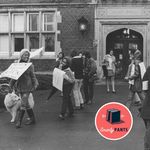#113: Getting Physical
When thinking of the past, one of the hardest things is to imagine what it would have been like to inhabit a physical body in a world so different in look, smell, and feel from our own. What was it like to go to the doctor 800 years ago? If you cut your finger and bled, what would that blood mean to you? What about the blood of saints—would that be different? What about exercising, eating, giving birth, having sex, burying the dead? The way we think about these experiences fundamentally changes how we experience them. So how has our thinking changed since the Middle Ages? Jack Hartnell’s new book, Medieval Bodies, explores the answers to these questions through a series of vivid objects, stories, texts, and paintings, starting with the head and meandering through skin and heart and stomach all the way to the feet. Along the way, he constructs a living, breathing body of evidence that helps us understand our physical past.
Quick note: In our sign off, we promised a Thanksgiving episode—but a holiday cold has made liars of us, and we cannot put one out! We'll be back with a brand new interview on Friday, December 6th. Til then, take care, and stay warm!
Go beyond the episode:
- Jack Hartnell’s Medieval Bodies: Life and Death in the Middle Ages (read an excerpt here)
- View a slideshow of related bodily medieval images on the episode page
- For more on medieval women’s medicine, check out Monica Green’s Making Women’s Medicine Masculine or her paper, “Gendering the History of Women’s Healthcare”
- For another unusual angle of medieval history, check out our interview with Marion Turner, who wrote an innovative biography of Geoffrey Chaucer
Tune in every week to catch interviews with the liveliest voices from literature, the arts, sciences, history, and public affairs; reports on cutting-edge works in progress; long-form narratives; and compelling excerpts from new books. Hosted by Stephanie Bastek. Follow us on Twitter @TheAmScho or on Facebook.
Subscribe: iTunes • Feedburner • Stitcher • Google Play • Acast
Have suggestions for projects you’d like us to catch up on, or writers you want to hear from? Send us a note: podcast [at] theamericanscholar [dot] org. And rate us on iTunes! Our theme music was composed by Nathan Prillaman.
Hosted on Acast. See acast.com/privacy for more information.









